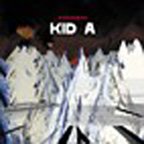Radiohead shakes things up
 Imagine yourself between two mirrors, one in front of you and one behind, your image duplicated in a multilayered experience of unreality. This experience is the visual equivalent of "Kid A."
Imagine yourself between two mirrors, one in front of you and one behind, your image duplicated in a multilayered experience of unreality. This experience is the visual equivalent of "Kid A." According to lyricist Thom Yorke, the album title refers to the would-be name of the first human clone. And like the group`s previous album, "OK Computer," (1997) this album challenges the so-called technical progress of our times. Unlike other groups who tentatively try to "fight the power" with tired lyrics or angry beats, Radiohead shakes things up by stretching musical boundaries. The group distorts rock and roll until it`s unrecognizable, twisting and turning guitar licks, pianos chords and drum beats until you`re not quite sure what is coming through your stereo - but you don`t care. "Kid A" will alternately move you to tears, paralyze you with depression and jolt you with adrenaline.
This isn`t an album that invites you in, sits you down and bowls you over with heavy riffs or in-your-face vocals. In "How to Disappear Completely," digitally distorted strings heft and roil with pain and the beat seems to move forward with the creaking, determination of an old woman moving toward a long-
lost lover. A haunting piece of rock poetry, its title is a reflection of the ephemeral quality of the music. Yorke sings in his best, high-pitched muffled warbling, "I`m not here, this isn`t happening."
If you`re expecting the hard beats of "Paranoid Android" or the hooks of "Creep", you`ll be disappointed - although two songs do come near the grinding rock of those familiar hits. "Optimistic" is a smooth, voodoo-laden piece of percussion that exudes a Pearl Jam-like vibe, although Yorke`s vocal restraint keeps the piece from falling into hyper-masculine bombast. "The National Anthem" features one repeated, classic-rock-style bass line, but assaults you with a Space-Age guitar, crazed cymbals and a cacophony of Miles Davis-like horns. It`s a musical mess, but it`s tight. Yorke agonizingly blurts "Everyone is so alone." He`s dancing on the line where experimental jazz meets rock and almost alienates you - but not quite.
Some songs do alienate, however. "Treefingers" drops you off on the other side and winds up feeling almost like New Age relaxation music. And "Motion Picture Soundtrack," the album`s closing tune, fades out with a resigned sigh, leaving you disconnected and lost.
This disconnection is part of the point though. Radiohead has always maintained an outsider position on the rock landscape. And despite "Kid A`s" current position at the top of the charts, that image stays put.
"You`re the One"; Paul Simon; Warner Brothers.
Listening to Paul Simon`s "You`re the One," is like visiting with an old man who relishes telling stories to the young folks about what it`s like to have lived and to start winding down for the inevitable end.
Musically, "You`re the One," is a return to simpler days for Simon. The album doesn`t rely on the same influences as with "Graceland" (1986) or "The Rhythm of the Saints" (1990). And although a South African influence does show up in some of the more elaborate drum arrangements, most of these songs are guitar/percussion/bass affairs. The focus on storytelling and songwriting is reminiscent of "Hearts and Bones," Simon`s 1983 solo effort.
In "Old," Simon grinningly, wisely riffs on "getting old" with lyrics like "first time I heard `Satisfaction`/ I was young and unemployed."
At times Simon`s staked-out position as a mature, experienced elder holds the album back. The "wisdom" of the lyrics and the often-bland music can clash painfully. In "Love" he sings, "I need it so much/makes you want to get down and crawl like a beggar/for its touch." Naked lyrics like these should come clothed in passionate music that kicks in anguish. Simon`s languid acoustic guitar licks don`t do the job.
A similar problem manifests in "Pigs, Sheep and Wolves," a too obvious indictment of the death penalty that uses an Orwellian theme. The final song on the album, "Quiet," closes the lid on Simon`s reflective stance, "I am heading for a time of quiet/when my restlessness is past/and I can lie down on my blanket/and release my fists at last." The music of the song is barely audible, the sounds of a harp float with small stillness.
You can`t help wishing the 59-year-old Simon would get off his aging trip, because when he`s having fun the music is a blast. Simon`s at his best with lyrics like "There was an old woman/who lived in a shoe/she was baking a cinnamon pie/she fell asleep in a washing machine/woke up in a hurricane eye."
Who knows, though, in 20 years maybe he`ll probably look back on this collection of songs, shrug his shoulders and say, "Well, I was young then."
Visit Copley News Service at www.copleynews.com.
(c) Copley News Service
advertisement

Author: Emily Friedlander
Archives
Leroy - remember his name
A multiethnic musical tour
No translation required
10 best guitar solos of all time
Animated music to keep you animated
Janet, is that all there is?
Dave Matthews` new sound gets old
The ideal record store
Limp Bizkit is still angry at everything
Bjork`s at her quirky best on `Selmasongs`
Madonna`s `Music` is a copy of a copy
`Volumizer` a breath of fresh beats
Fugee this, Fugee that
Morcheeba: Hip-hop meets disco
Ramblin` Jack`s in a league of his own
More Articles







